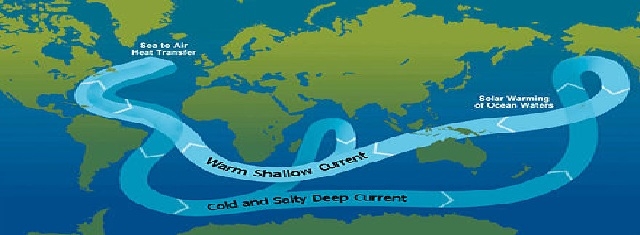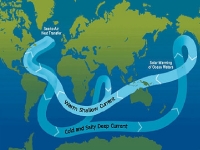Politics
GLOBAL CONSENSUS THAT CLIMATE CHANGE IS A SIGNIFICANT CHALLENGE
GLOBAL CONCERN FOR LIMITING EMISSIONS

CLIMATE CHANGE (Source: Wikipedia)
In a few weeks, world leaders will gather in Paris to negotiate a climate change agreement that will frame the global agenda on this issue for the next decade and beyond. As a new Pew Research Center survey illustrates, there is a global consensus that climate change is a significant challenge. Majorities in all 40 nations polled say it is a serious problem, and a global median of 54% consider it a very serious problem. Moreover, a median of 78% support the idea of their country limiting greenhouse gas emissions as part of an international agreement in Paris.
Climate change is not viewed as a distant threat. Across the nations surveyed, a median of 51% believe people are already being harmed by climate change and another 28% think people will be harmed in the next few years. More than half in 39 of 40 countries are concerned it will cause harm to them personally during their lifetime (the United Kingdom is the exception), and a global median of 40% are very worried this will happen.
In most countries, publics tend to believe that much of the burden for dealing with climate change should be shouldered by wealthier countries. Across the nations polled, a median of 54% agree with the statement 'Rich countries, such as the U.S., Japan and Germany, should do more than developing countries because they have produced most of the world´s greenhouse gas emissions so far.' A median of just 38% believe that 'Developing countries should do just as much as rich countries because they will produce most of the world´s greenhouse gas emissions in the future.' However, in six countries, half or more say developing nations should do just as much. Half of Americans hold this view, while 40% think rich countries should do more....
Still, despite considerable agreement on many climate issues, there are also important differences between regions and countries, and often, within nations. Concerns about climate change are especially common in Latin America and sub-Saharan Africa. However, they are less prevalent in China and the U.S., the two largest greenhouse gas emitters. For instance, just 18% of Chinese and 45% of Americans say climate change is a very serious problem, compared with a global median of 54%. Similarly, while four-in-ten around the world are very worried that global warming will harm them personally, just 15% in China and 30% in the U.S. share this fear...
People around the world are concerned about a variety of possible consequences of climate change, but drought tops the list. Survey respondents were presented with four potential effects of global warming, and were asked which one most concerns them: droughts or water shortages; severe weather, such as floods or intense storms; long periods of unusually hot weather; or rising sea levels. Drought is the most common response (or tied for the most common response) in 31 countries, including the U.S., where 50% say this is the possible effect that concerns them most. Fears of drought are particularly prevalent in Latin America and Africa ““ in both regions, a median of 59% say this is their top concern....
The degree to which people fear climate change will affect them personally varies substantially across the globe. The share of the public saying they are very concerned it will personally harm them during their lifetime ranges from less than 20% in the UK, Australia, Germany, China, Israel and Poland, to more than 70% in Uganda, Brazil, Burkina Faso, the Philippines and Ghana....
......
Source : PewResearchCenter (Part of the Total results)
Ruby BIRD
http://www.portfolio.uspa24.com/
Yasmina BEDDOU
http://www.yasmina-beddou.uspa24.com/
......
Source : PewResearchCenter (Part of the Total results)
Ruby BIRD
http://www.portfolio.uspa24.com/
Yasmina BEDDOU
http://www.yasmina-beddou.uspa24.com/
Ruby Bird Yasmina Beddou Climate Change Global Concern Consensus Challenge Pew Research Center Limiting Emissions Agreement Problem Paris Greenhouse Gas Emissions Cop21
Liability for this article lies with the author, who also holds the copyright. Editorial content from USPA may be quoted on other websites as long as the quote comprises no more than 5% of the entire text, is marked as such and the source is named (via hyperlink).






